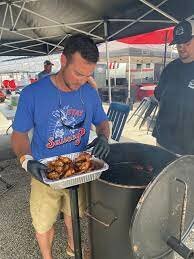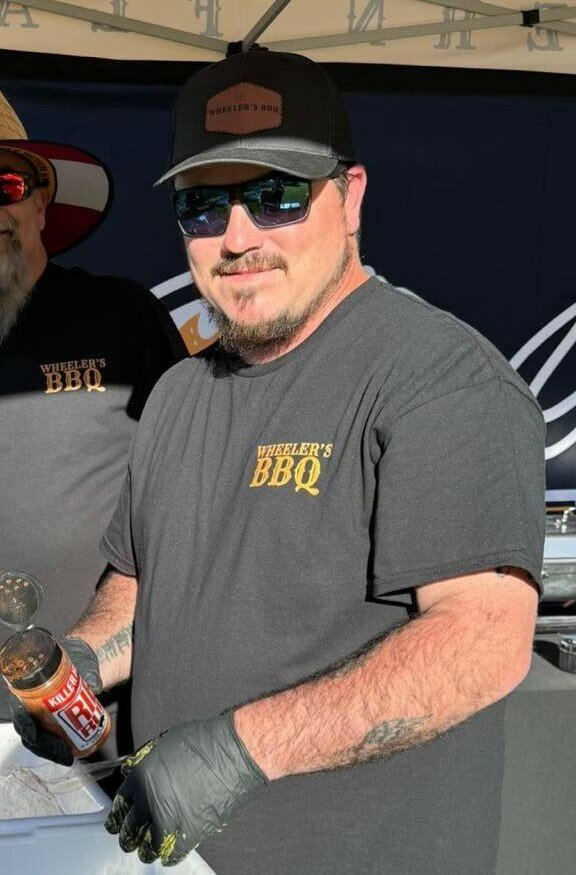Fire up grill for sweet, smoky smell of success
Tips for turning flame-broiled disasters into pitmaster perfection
CLAY COUNTY — There’s more to cooking the perfect piece of meat over an open flame than soaking it with lighter fluid, throwing a match, and watching the smoke blanket the neighborhood in a …
This item is available in full to subscribers.
Attention subscribers
To continue reading, you will need to either log in to your subscriber account, below, or purchase a new subscription.
Please log in to continueDon't have an ID?Print subscribersIf you're a print subscriber, but do not yet have an online account, click here to create one. Non-subscribersClick here to see your options for subscribing. Single day passYou also have the option of purchasing 24 hours of access, for $1.00. Click here to purchase a single day pass. |
Fire up grill for sweet, smoky smell of success
Tips for turning flame-broiled disasters into pitmaster perfection
CLAY COUNTY — There’s more to cooking the perfect piece of meat over an open flame than soaking it with lighter fluid, throwing a match, and watching the smoke blanket the neighborhood in a greasy fog.
Most of us would like to believe we are the King of the Cookout, the Sultan of the Smoker, and the Potentate of the Pit. However, most of us lack the skill and patience to turn a slab of raw meat into a juicy, smoke-ringed masterpiece.
“First, it’s a passion,” said Blues Hog BBQ championship team member Josh Skipper. “It’s supposed to be simple. It takes in all the senses – the smell, the taste, the sound, the sight and the touch.”
Skipper lives on Fleming Island and was part of the 2022 team that won the Whole Hog competition at Memphis in May, considered the World Championship. This year, Blues Hog finished fourth in Whole Hog and first in Seafood.
Like most grilling experts, there are differing opinions on achieving perfection. But most agree on a few basic facts: it takes patience, the proper cooking vessel and fuel, and quality meat and vegetables.
“I enjoy the atmosphere of being outside,” said Middleburg's Jason Wheeler, who has a catering food truck, Wheeler’s Barbecue. “Once you learn the art of true barbecue and what it takes to make really good barbecue, that’s what really makes it fun because you put in the time and the effort. It’s just slow smoke.”
Wheeler said he prefers using pecan wood. Others like oak or hickory.
According to the Grill Masters Club, oak and post oak are best for brisket, sausage, ribs, and chicken. Hickory is popular in the South and is best for pork and chicken. Maple has a sweeter undertone for bacon, ham, cheese, and vegetables, while pecan is similar to hickory and is best for pork, beef, and chicken. Alder works best with seafood, and Mesquite has a savory smoke flavor for chicken and larger cuts of pork and beef.
G's Slow Smoked BBQ owner Gary Park said one of the biggest mistakes made by amateur grillers is adding the meat too soon.
“You’ve got to wait until the charcoal burns down,” he said. “When I started 20 or 30 years ago, I always ruined some hamburgers. I used charcoal, probably Kingsford or something, and lighter fluid, which is fine if you let it burn out. But I didn’t let it burn out in time. I was ready to eat my hamburgers, and they smelled like lighter fluid, so they were ruined.”
Todd Knowles, owner of Premier Gas and Grills in Green Cove Springs, said the type of fuel you use is critical.
“If you’re serious about grilling, you should have three grills,” he said. “Charcoal is from steaks and chicken. A pellet smoker is for ribs and brisket. A gas grill is for hot dogs, burgers and vegetables. Yes, I said vegetables. Grilling vegetables in a good pan with oil and seasonings is amazing.
“Each grill has a purpose. Pellet grills are great for smoking meats and are easy to use, while charcoal grills take a little more work but are always worth the wait once you take a bite. Propane can cook many things, but you must cook low and slow.
“Remember, with anything, preparation and time is what it takes to produce great-tasting food. We aren’t microwaving. We’re grilling.”
World champions are determined by cooking whole hogs. But since most of us either can’t or won’t face that challenge, a brisket is considered one of the most difficult items to master, especially a whole brisket, since one end has two layers and the other is considerably thinner.
Again, the secret is low and slow.
It could take 20 hours to trim, season, inject and cook a 16-pound brisket. And during that time, you must keep an eye on the fire to maintain a 225-275-degree temperature. It’s best to start new charcoal and wood outside the grill and add the embers to the fire to avoid the bitter taste of creosotes until it burns off.
Also, it’s important to cook brisket wrapped in butcher paper or foil on the grill for the final two hours and let it “rest” for another hour before you cut into it. Your patience will be rewarded.
Park, who will open two BBQ restaurants in Starke and Green Cove Springs, said if you’re in a hurry, go through the drive-thru line and the local burger joint. But if you want a real reward, light the grill, pull up a lawn chair and wait.
“For me personally, when it comes to barbecue, it’s my passion,” he said. “I love barbecue. It’s a game of patience. You want to ensure your fire’s right because you want a good, clean smoke.”
When you master that, you can tackle which sauce is best. There are Texas and Kansas City sauces, Alabama white sauce, North Carolina vinegar, and Lexington sauces. Georgia has a sauce, as do South Carolina, Florida, Memphis, and St. Louis. There are even mustard sauces and dry spice rubs.
You’re on your own when it comes to sauces.










